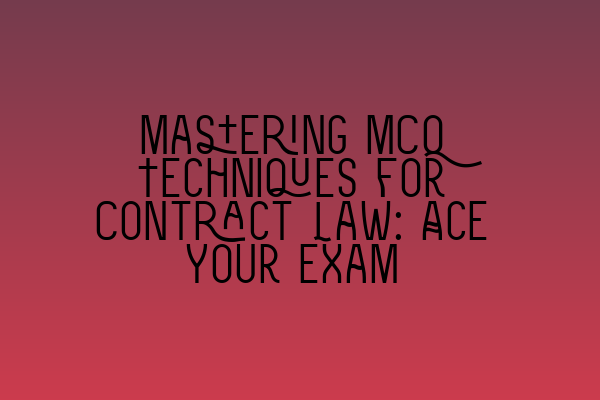Mastering MCQ Techniques for Contract Law: Ace Your Exam
Contract Law is a fundamental subject in the field of law. Whether you are a law student preparing for exams or a practicing solicitor looking to brush up on your knowledge, mastering MCQ (Multiple Choice Question) techniques can significantly improve your chances of success. In this article, we will explore effective strategies and tips to help you ace your Contract Law exams.
1. Understanding the Structure of MCQs
Before diving into the techniques, it is essential to understand the structure of MCQs. Typically, MCQs consist of a question followed by several options. Only one option is correct, while the others are distractors. It is crucial to carefully read the question and all the options before selecting your answer.
2. Read the Question Carefully
The key to success in MCQ exams is attention to detail. Read each question carefully, paying close attention to the wording and nuances. Some questions may include principles, exceptions, or specific facts that can alter the correct answer. Avoid making assumptions and rely solely on the information provided in the question.
To further enhance your understanding of Contract Law concepts, it is beneficial to engage with study resources such as textbooks, lecture notes, or online courses. These resources can provide additional insights and examples to reinforce your understanding.
3. Eliminate Incorrect Options
Once you have read the question, analyze each option and systematically eliminate the incorrect ones. Look for indicators that can help you identify the correct answer. These indicators may include keywords, phrases, or legal principles discussed in your studies.
Remember to critically examine each option and compare them to the facts and principles presented in the question. By eliminating the incorrect options, you increase your chances of choosing the correct answer even if you are unsure.
4. Be Mindful of Trap Options
MCQ exams often include trap options designed to confuse test-takers who are not paying close attention. These options may seem plausible at first glance but are ultimately incorrect. Be aware of common traps such as vague or overly broad options, plausible-sounding but incorrect legal principles, or options that contradict the facts presented in the question.
Staying vigilant and pinpointing the traps can help you avoid falling into these pitfalls. Remember, the correct answer should align with the established legal principles and the specific facts of the question.
5. Make Use of Prior Knowledge
Prior knowledge of Contract Law principles and concepts can be invaluable while tackling MCQ exams. By having a solid foundation of legal knowledge, you can quickly identify correct answers based on your understanding of the subject matter.
If you find yourself struggling with a particular question, try to recall relevant case law, statutory provisions, or legal doctrines that may apply. Effective studying through practice exams, revision exercises, and discussions with peers or mentors can help you develop this prior knowledge and boost your confidence.
For mentorship opportunities and guidance from experienced solicitors, check out our related article: Mentorship for Aspiring Solicitors: Nurturing Talent in the Legal Field.
6. Practice, Practice, Practice
Like any skill, mastering MCQ techniques requires practice. Regularly test yourself with mock exams or sample questions to become familiar with the format and learn from your mistakes. Pay attention to the explanations provided for each answer to gain insights into the reasoning behind the correct choice.
Additionally, dedicating time to solving MCQs can help you identify any knowledge gaps or weak areas. Focus your revision efforts on these topics and seek additional resources or guidance when necessary. The more practice you engage in, the more comfortable and confident you will become in answering MCQs.
If you are interested in alternative dispute resolution methods and their application in Contract Law, we recommend checking out our related article: Exploring Alternative Dispute Resolution: An Effective Approach to Legal Conflicts.
7. Time Management
Time management is crucial in MCQ exams, as you are often limited by a specific timeframe. Allocate an appropriate amount of time for each question, keeping in mind that spending too much time on a single question may compromise your ability to answer subsequent ones.
If you encounter a difficult question, it may be more beneficial to temporarily move on and return to it later. This approach allows you to maximize your chances of answering the easier questions correctly and ensures that you do not leave any questions unanswered due to time constraints.
8. Stay Calm and Confident
Finally, maintaining a calm and confident mindset during your exam is essential. Eliminate distractions, take deep breaths, and trust in your preparation and knowledge. Stress and anxiety can hinder your ability to think clearly and increase the likelihood of making avoidable errors.
Remember, you have dedicated time and effort to study Contract Law and develop your understanding of the subject. Trust in your abilities and approach each question with a composed and focused mindset.
To further enhance your skills as a solicitor and broaden your legal expertise, read our related article: The Art of Contract Drafting and Negotiation: Skills Every Solicitor Should Master.
Conclusion
Mastering MCQ techniques for Contract Law exams requires a combination of careful reading, critical thinking, and prior knowledge. By understanding the structure of MCQs, eliminating incorrect options, and being wary of traps, you can significantly increase your chances of selecting the correct answers.
Remember to practice consistently, manage your time effectively, and approach the exam with confidence. With these strategies in place, you are well on your way to acing your Contract Law exams and advancing in your legal career.
For more information on the Legal Practice Course and the qualifications required to become a solicitor, read our related article: Navigating the Legal Practice Course (LPC): Your Path to Solicitor Qualification.
Finally, don’t forget to prioritize client care skills as a solicitor. Find out more in our related article: Mastering Client Care Skills: Essential for Solicitors.
